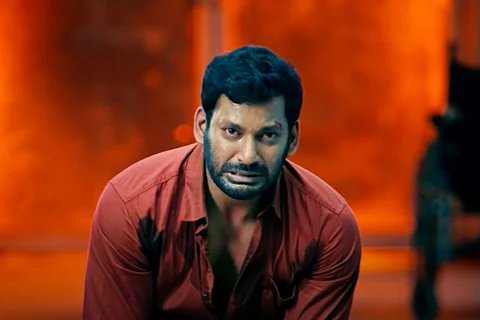

Veeramae Vaagai Soodum translates to ‘it is bravery that will wear the crown of victory’. The ‘king’ on the hunt for this crown is Porus (Vishal), named after an ancient king who is said to have stood up to Alexander’s might. If that inspires visions of a mighty hero striding across the screen and fighting an awe-inspiring battle, you should considerably lower your expectations. Thu Pa Saravanan’s film with Vishal in the lead is so full of cliches and convenient coincidences that I wondered if the title ‘Kaadhil Poo Soodavum’ (a difficult-to-translate Tamil phrase that implies gullibility) would have been more suitable since that’s what it demands from the audience.
Porus is an aspiring policeman. His father (Marimuthu) is a lower rung cop. His mother (Tulasi) is, well, a Tamil cinema mother who thinks her son is fantastic. His thangachi Dwaraka (Raveena Ravi) exists for the same reason as thangachis have existed in Tamil cinema since MGR’s times. Sister sentiment+motive for the hero to showcase his masculinity. His close friend is Thalapathy (Yogi Babu), who is in the habit of falling in love with different women every month and harassing them with love letters. But this is meant to be funny because it’s Yogi Babu doing it; we are supposed to get angry only when someone with VILLAIN written on their forehead does it to the hero’s thangachi. There’s also Mythili (Dimple Hayathi), Porus’s girlfriend since school, who always appears with one inch thick foundation, perfectly applied eyeliner and lipstick in all scenes, whether she’s romancing Porus or weeping at a funeral.
This is Porus’s world, and Saravanan wastes a lot of time establishing the relationships and equations between the characters. Not that doing so is unimportant but because it’s done so badly. Here’s a sample of what passes for romance in the film — Mythili’s parents are against her marrying Porus, so he walks into a girl-seeing ceremony and disappears with her into the bedroom. Her mother, who is listening with her ear to the door, is devastated because she can hear them having sex. But friends, it is revealed that Porus and Mythili didn’t ACTUALLY have chee-chee premarital sex, and were only making such suggestive noises to make her parents THINK that they had sex. They were looking at their phones the whole time while making these noises. Much culture, much brilliance, much wow. The original Porus may have come up with some genius strategies to take on Alexander but even he would have been stumped by Vishal’s Porus.
Just when you are wondering if there’s any point to the film, Saravanan adds more characters to the mix. The screenplay jumps from one plot thread to another in an attempt to create an engaging, intriguing, hyperlink crime thriller. But the writing is so superficial that we don’t care about any of the characters. Large men with varying amounts of facial hair growl on screen about what they desire, talking about gauravam, rats, snakes and random philosophy. Baburaj, who delivered such a wonderfully nuanced performance in Joji, is reduced to playing a thug whose character appears for nearly the whole film but if we’re asked what sort of man he is, we’d only be able to say that he laughs loudly and wears thick, gold chains. There’s a reference to a ‘Vedha’ factory (obviously inspired by Vedanta) that’s causing health issues among the locals, and an activist called Parisutham (Elango Kumaravel), but again the investment in the issue is so shallow that it amounts to insensitivity.
Watch: Trailer of Veeramae Vaagai Soodum
The film is full of inconsistencies and gaps in logic. For instance, Porus asks a hacker for help to solve a crime and the man says he’s unable to trace the evidence that Porus wanted. But later, when Porus is at a hospital because of entirely unexpected circumstances, the hacker appears out of the blue, playing the ‘evidence’ in a speaker. Why is he playing it on a speaker? Because Porus is on the phone with the villain and the villain has to look astounded for ‘effect’ (the hacker, mind you, has no idea that Porus is on the phone). How did the hacker know where Porus was? Why did he bring a speaker with him? How is the sound quality so great that the villain can hear the evidence so clearly though the hacker is playing it somewhere far away in a hospital corridor? As you can see by the number of questions I have, I was forced to drink one too many coffees to stay awake through the film.
The villain calls Porus a ‘samanya paradesi’ (an ordinary nobody) and yet spends enormous time, money and human resources (a euphemism for the number of murders he commits) to hide from him when a bullet would have done the job. Early on, Mythili humiliates her manager who tries to harass her sexually; she advises another colleague who had to give into his advances that whether men should worship or ‘call’ women (kumbudradha koopudradha) lies in the hands of women. This is supposed to be some whistle-worthy moment of enlightenment for the audience, and yet, two of the film’s three plot threads are about women who stand up to sexual harassment and don’t get worshipped for it. Sigh.
Neither Yuvan’s background score nor the well-choreographed fights can save the film from devolving into a complete mess. It’s not only veeram you need to sit through it but also a good degree of masochism. Or commitment to a job, like this reviewer.
Disclaimer: This review was not paid for or commissioned by anyone associated with the film. Neither TNM nor any of its reviewers have any sort of business relationship with the film’s producers or any other members of its cast and crew.